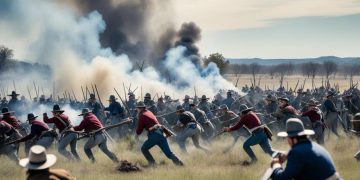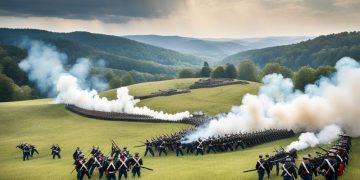Welcome to the epic saga of Alexander the Great, the legendary figure whose larger-than-life story has captivated audiences for centuries. In this article, we will embark on a journey through history to explore the remarkable life and enduring cultural impact of this influential world leader.
From his early life to his monumental battles, Alexander the Great’s legacy can be felt in every corner of the world. His story is one of ambition, conquest, and the transformation of empires. Join us as we unravel the mysteries surrounding his life and delve into the profound influence he had on the world as we know it.
Key Takeaways:
- Alexander the Great’s life is an epic saga filled with conquests, triumphs, and cultural influence.
- His early years and upbringing shaped the future leader he would become.
- Through his strategic military campaigns, Alexander the Great conquered vast territories.
- His cultural legacy spread Greek influence, shaping art, architecture, and literature.
- The circumstances surrounding Alexander’s death remain a mystery, leaving room for speculation.
The Early Life of Alexander the Great
Explore the captivating early life of one of history’s greatest conquerors and leaders, Alexander the Great. His remarkable journey began in 356 BC in the ancient city of Pella, located in the kingdom of Macedonia.
As the son of King Philip II of Macedonia and Queen Olympias, Alexander was destined for greatness from the moment of his birth. Growing up in the royal court, he received a privileged education, studying under the tutelage of renowned philosophers and scholars, including Aristotle himself.
It was during this formative period that Alexander’s character and ambitions began to take shape. His exposure to the arts, literature, and philosophy instilled in him a deep appreciation for knowledge and culture.
One of the most influential figures in Alexander’s early life was his father, King Philip II. As a military strategist and visionary leader, Philip II laid the foundation for Alexander’s future military conquests. He taught his son the art of war, exposing him to the intricacies of battle strategy and the importance of fearless leadership.
A pivotal moment in Alexander’s youth was the taming of his spirited horse, Bucephalus. Despite being deemed untameable, Alexander managed to mount and control the horse, showcasing his determination, courage, and natural ability to command.
With every passing year, Alexander’s thirst for conquest and glory intensified. His dreams of emulating the heroics of ancient Greek legends, such as Achilles and Heracles, fueled his relentless pursuit of adventure and conquest.
To further enhance his military training, Alexander joined his father’s army at the age of 16 and quickly proved himself to be an exceptional commander. His prowess on the battlefield earned him the respect and admiration of his troops, setting the stage for his future conquests.
Throughout his early life, Alexander the Great forged close bonds with his companions, known as the “Companions.” These loyal and capable individuals, who shared his vision and unwavering loyalty, would stand by his side throughout his epic saga.
In the next section, we will dive into the monumental battles and conquests that would propel Alexander the Great into the annals of history.
Key Battles and Conquests
Dive into the dramatic battles that defined Alexander the Great’s military career. His strategic brilliance and unwavering determination propelled him to victory on numerous occasions, solidifying his place in history as one of the greatest commanders of all time. Let’s explore some of the key battles and conquests that shaped his legendary campaigns.
Battle of Granicus
The Battle of Granicus in 334 BCE marked Alexander’s first major victory against the Persian Empire. Despite facing a larger force, Alexander’s expert tactics and well-disciplined troops enabled him to outmaneuver and defeat the Persian army. This triumph opened the gateway to Asia Minor and set the stage for further conquests.
Battle of Gaugamela
The Battle of Gaugamela, fought in 331 BCE, was a decisive moment in Alexander’s quest to overthrow the Persian Empire. Facing the mighty Persian king Darius III, Alexander demonstrated his strategic genius, utilizing a double envelopment tactic to flank and rout the Persian forces. This victory resulted in the collapse of the Persian Empire and the crowning of Alexander as the ruler of an immense empire.
Siege of Tyre
The Siege of Tyre in 332 BCE showcased Alexander’s determination and innovative military tactics. Tyre, a formidable island fortress, seemed impregnable. However, Alexander devised a daring plan to construct a causeway that connected the mainland to the island, allowing his forces to breach the city’s defenses. This strategic triumph demonstrated Alexander’s adaptability and his ability to overcome seemingly insurmountable obstacles.
The Conquest of Egypt
Alexander’s conquest of Egypt in 332 BCE was a turning point in his campaign. The Egyptians welcomed Alexander as a liberator from the oppressive Persian rule, and he was crowned as the pharaoh of Egypt. This conquest not only added a wealthy and strategic region to his empire but also cemented his reputation as a charismatic and benevolent ruler.
Throughout his military career, Alexander the Great conquered vast territories, including Persia, Egypt, and parts of India. His military prowess and unparalleled ambition paved the way for the expansion of Greek culture and the spread of Hellenism. His conquests had a lasting impact on both the eastern and western worlds, shaping the course of history.
| Battle | Date | Opposing Force | Outcome |
|---|---|---|---|
| Battle of Granicus | 334 BCE | Persian Empire | Alexander’s Victory |
| Battle of Gaugamela | 331 BCE | Persian Empire | Alexander’s Victory |
| Siege of Tyre | 332 BCE | Tyre | Alexander’s Victory |
| The Conquest of Egypt | 332 BCE | Egypt | Alexander’s Victory |
Alexander’s Cultural Legacy and Influence
Uncover the profound impact Alexander the Great had on the ancient world and beyond. His extraordinary conquests not only expanded his empire but also spread Greek culture, leaving an indelible mark on art, architecture, and literature.
Through his military campaigns, Alexander introduced Greek customs and traditions to the lands he conquered. This cultural exchange had a lasting influence on the conquered civilizations, blending their existing heritage with the vibrant Greek culture.
“The cities Alexander founded were not mere military strongholds; they were thriving hubs of arts, sciences, and learning. His vision was to fuse the best of Greek culture with the diverse traditions of the East.”
Alexander’s influence on art and architecture can still be seen today. The Hellenistic art movement, which flourished after his conquests, integrated Greek artistic principles with local styles, resulting in unique and innovative creations. Sculptures, mosaics, and frescoes exemplify the fusion of Greek aesthetics with the distinct cultural expressions of the conquered lands.
The Spread of Greek Literature
Alexander’s conquests also facilitated the diffusion of Greek literature and language. Greek became the lingua franca of the conquered territories, enabling the exchange of ideas, knowledge, and literature. Greek playwrights, poets, and philosophers gained a wider audience in the newly established Hellenistic cities, triggering a literary renaissance that would shape the future development of literature.
- Epics like Homer’s Iliad and Odyssey were translated into various languages, ensuring their preservation and wider accessibility.
- Greek philosophy, with influential figures like Aristotle and Plato, spread across the conquered lands, inspiring new intellectual movements and debates.
- Historians such as Herodotus and Thucydides became foundational sources for future historical inquiries, providing valuable insights into the events of the ancient world.
The enduring impact of Alexander’s cultural legacy is a testament to his unmatched vision and ambition. His empire may have eventually fractured, but the influence of Greek culture continued to resonate throughout the centuries, leaving an indelible mark on the regions he conquered and shaping the course of human civilization.
The Mystery of Alexander’s Death
As we uncover the remarkable life of Alexander the Great, we are drawn to one of history’s greatest mysteries – his untimely death. The circumstances surrounding his demise continue to captivate historians and scholars alike, leading to numerous theories and speculations.
Alexander the Great passed away in June 323 BC at the age of 32, leaving behind a vast empire and a legacy that would endure for centuries to come. However, the exact cause of his death remains shrouded in mystery.
One theory proposes that Alexander succumbed to a fever brought on by an infection or illness. It suggests that these health issues were a result of his grueling military campaigns and the toll they took on his body.
Another possibility is that Alexander was poisoned. Some believe that he was intentionally poisoned by one of his companions or enemies, motivated by political intrigue or personal rivalry.
“The death of Alexander the Great is a riddle that continues to perplex historians and researchers. The lack of concrete evidence leaves room for speculation, allowing different theories to emerge,” says Dr. Elizabeth Thomas, a renowned historian specializing in ancient civilizations.
Furthermore, recent scientific studies have suggested that Alexander the Great may have died from malaria. These studies have analyzed skeletal remains attributed to him and detected DNA evidence of malarial parasites.
Unveiling the Truth
The mystery surrounding Alexander’s death has spurred countless investigations and sparked debates among scholars. While we may never know the definitive answer, the intrigue and fascination surrounding his untimely demise continue to fuel our curiosity. The enigma of Alexander the Great’s death remains an integral part of his enduring legacy.
The Division of His Empire
After the untimely death of Alexander the Great, his vast empire faced a complex and tumultuous period of division. With no clear successor, his generals sought to claim their share of power and territory, leading to political struggles and conflicts.
The division of Alexander’s empire among his generals ultimately resulted in the formation of several Hellenistic states, each controlled by a different leader. These states, known as the Diadochi, were carved out of the vast territories that Alexander had conquered, stretching from Greece and Egypt to Persia and beyond.
The division was not a peaceful process. The generals vied for control, leading to a series of wars and power struggles that lasted for decades. These conflicts, known as the Wars of the Diadochi, shaped the future of the Hellenistic world and had a lasting impact on the regions once ruled by Alexander.
The division of the empire also had significant consequences for the cultures and societies within the conquered territories. The Hellenistic states introduced Greek culture and customs, blending them with local traditions and creating a unique fusion of cultures that influenced art, architecture, language, and literature.
To better understand the complexity of the division, consider the following table:
| General | Territories |
|---|---|
| Ptolemy I | Egypt, Cyprus, and parts of Syria and Palestine |
| Seleucus I | Persia, Mesopotamia, and parts of Central Asia |
| Antigonus I | Greece and Macedonia |
| Lysimachus | Thrace and parts of Asia Minor |
These were just a few of the territories that were divided among the generals, and their success in holding onto their respective regions varied over time. The division of the empire was not a neat and orderly process, but rather a chaotic and often violent struggle for power.
Conclusion
As we conclude our exploration of the epic saga of Alexander the Great, we are left in awe of his extraordinary achievements and the enduring legacy he created. From his early life to his monumental battles, Alexander the Great’s story is a testament to the indomitable spirit and ambition of an extraordinary leader.
Alexander the Great’s impact on history cannot be overstated. His military genius and unparalleled conquests reshaped the world, leaving an indelible mark on civilizations that followed. The vast territories he conquered and the cultural fusion that emerged from his reign transformed the course of history.
But it is not just his military prowess that defines Alexander the Great. His cultural contributions, the diffusion of Greek influence, and his support for the arts and sciences have shaped the world for centuries to come. Today, his name continues to evoke a sense of awe and inspiration, reminding us of the indomitable spirit of human ambition.







